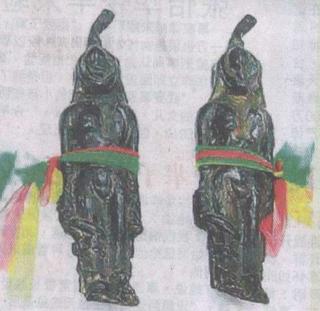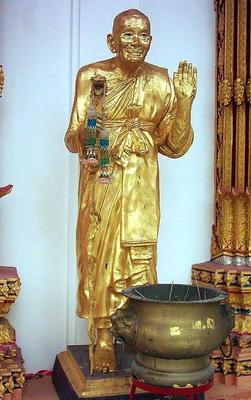
The Avatamsaka Sutra says:
"Such as the True Thusness, Which stays with its original nature, Remaining unchanging throughout."On 12.08.05 - 14.08.05 I made a pilgrimage trip to Had Yai, Songkhla Province in Southern Thailand. At one of the popular temples near Had Yai (Wat Pagor), I saw for myself the legendary body of Luangpor (Ajarn) Tong, whose physical body shows no sign of decay after passing away since the year 2000, at the age of 93.
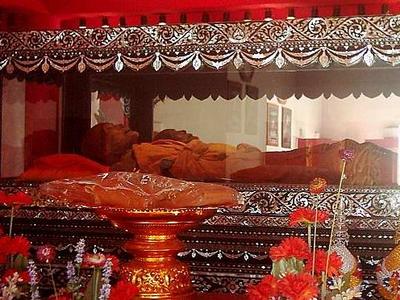
LP Tong looks as if he was sleeping, and other than the sunken facial features, one really cannot tell he has died for 5 years. According to the temple, his hair continues to grow and needs trimming every once in a while. This kind of phenomena is called "Flesh Body Buddha" in Buddhist terminology.
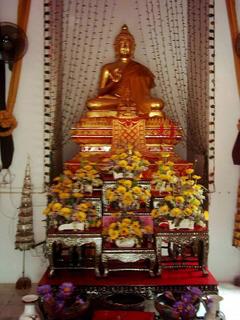
Only monks of high spiritual attainment can choose to keep their bodies in samadhi after they enter final nibbana. This is usually to serve a special purpose, because the normal tradition is to be cremated (like the Buddha) and the remaining relics be placed in a stupa or pagoda. Reports say that indeed there is such a special purpose in the case of LP Tong. Before he passed away, he had already left instructions for his disciples not to cremate his body. LP Tong wanted future generations of Buddhists from the whole region to gain confidence in the Triple Gems after seeing the miraculous aspects of the Dhamma through his undecaying body.
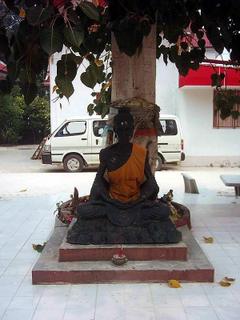
This alternative tradition is perhaps started by Maha Kassapa, the Buddha's foremost disciple who was also not cremated. According to the scriptures, Maha Kassapa flew inside Mount Kukkutapada (Chicken Foot Peak) and entered final nibbana there. His body will remain in eternal samadhi until the future Buddha Maitreya descends to Earth to teach the Dhamma many thousands of years later.
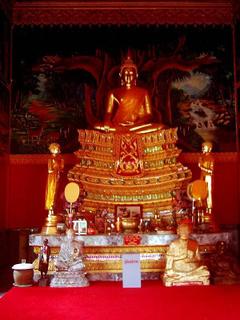
Coming back to the subject, LP Tong predicted that this small temple would become quite propserous with the bus loads of followers & tourists coming to see him after his death. Today, these words are proven right - Wat Pagor is thriving with pilgrims from Singapore, Malaysia & Thailand, who come daily to pay respects to him and ask for various blessings.
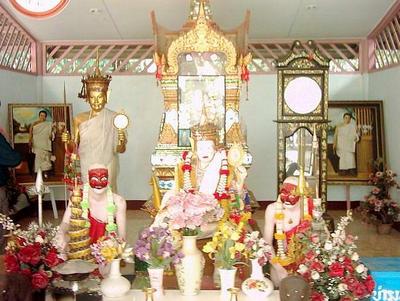
Besides LP Tong's undecaying body, I also got to see Maechee (Nun) Niam's skeletal remains. MC Niam was LP Tong's female teacher who had died decades ago. Out of respect for his teacher, LP Tong kept her body in a glass chedi to be venerated by himself and his followers. As I walked closer to take a look, I saw a dried yellowish skeleton in a seated position and garbed in the white robes of a non-ordained nun. Like the other countries of Theravada culture, Thailand does not have an order of Bhikkuni. Nuns could only take the 10 percepts and wear white robes instead of the saffron robes of the Sangha.
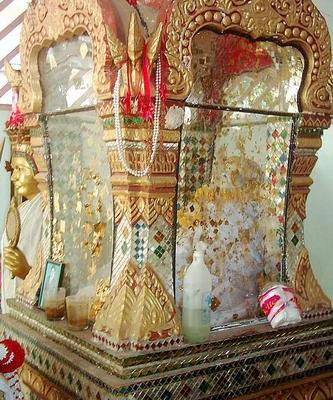
Irregardless, MC Niam was known to be a compassionate Nun who observed vegetarianism throughout her holy life, although it was not required of monks & nuns in the Theravada tradition.
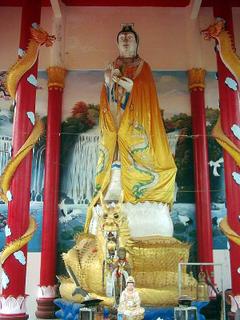
She is said to be able to grant the wishes of the faithful who pray to her, but they must also develope compassion and abstain from eating meat for a period of time. Paying respects to both LP Tong & MC Niam, one could not help but be filled with a profound sense of bliss. One regret I had was that I did not manage to meet LP Tong's successor, Abbot Maha Pairon when I went there; but rest assured I will be back for a future visit the next time.
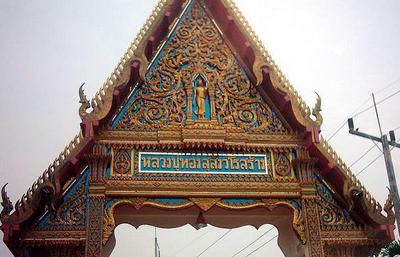 Reflecting on the undecaying bodies I've seen, I had an insight that although our physical body go through birth and death, happiness and suffering, sin and merit; our Buddha nature remains unmoving amidst all these. Everything we know, feel, experience, possess are ultimately unreal and does not belong to us.
Reflecting on the undecaying bodies I've seen, I had an insight that although our physical body go through birth and death, happiness and suffering, sin and merit; our Buddha nature remains unmoving amidst all these. Everything we know, feel, experience, possess are ultimately unreal and does not belong to us. 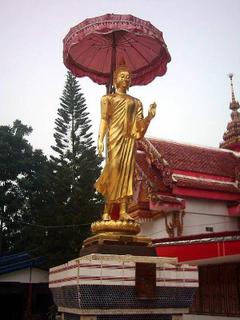 The Buddha is an illusionist turning an illusionary wheel of the Dhamma to teach illusionary sentient beings. If sentient beings attain any form of enlightenment, that is also unreal as there is nothing to realize and no suffering to end. What then is the absoulte truth, the true undecaying body which we cannot see? Meditate on this katha, especially the last verse, for the answer:
The Buddha is an illusionist turning an illusionary wheel of the Dhamma to teach illusionary sentient beings. If sentient beings attain any form of enlightenment, that is also unreal as there is nothing to realize and no suffering to end. What then is the absoulte truth, the true undecaying body which we cannot see? Meditate on this katha, especially the last verse, for the answer:
"Everynight I sleep with the Buddha, every morning it awakens with me. Whether sitting or standing it follows, whether speaking or silent it is there. Never leaving me for even an instant, it is no different from a shadow following the body. To know where this Buddha is, look right here in these words."
May you also see the true nature of your mind, sadhu.
 The scriptures say:
The scriptures say: The Avatamsaka Sutra says:
The Avatamsaka Sutra says: LP Tong looks as if he was sleeping, and other than the sunken facial features, one really cannot tell he has died for 5 years. According to the temple, his hair continues to grow and needs trimming every once in a while. This kind of phenomena is called "Flesh Body Buddha" in Buddhist terminology.
LP Tong looks as if he was sleeping, and other than the sunken facial features, one really cannot tell he has died for 5 years. According to the temple, his hair continues to grow and needs trimming every once in a while. This kind of phenomena is called "Flesh Body Buddha" in Buddhist terminology.  Only monks of high spiritual attainment can choose to keep their bodies in samadhi after they enter final nibbana. This is usually to serve a special purpose, because the normal tradition is to be cremated (like the Buddha) and the remaining relics be placed in a stupa or pagoda. Reports say that indeed there is such a special purpose in the case of LP Tong. Before he passed away, he had already left instructions for his disciples not to cremate his body. LP Tong wanted future generations of Buddhists from the whole region to gain confidence in the Triple Gems after seeing the miraculous aspects of the Dhamma through his undecaying body.
Only monks of high spiritual attainment can choose to keep their bodies in samadhi after they enter final nibbana. This is usually to serve a special purpose, because the normal tradition is to be cremated (like the Buddha) and the remaining relics be placed in a stupa or pagoda. Reports say that indeed there is such a special purpose in the case of LP Tong. Before he passed away, he had already left instructions for his disciples not to cremate his body. LP Tong wanted future generations of Buddhists from the whole region to gain confidence in the Triple Gems after seeing the miraculous aspects of the Dhamma through his undecaying body.  This alternative tradition is perhaps started by Maha Kassapa, the Buddha's foremost disciple who was also not cremated. According to the scriptures, Maha Kassapa flew inside Mount Kukkutapada (Chicken Foot Peak) and entered final nibbana there. His body will remain in eternal samadhi until the future Buddha Maitreya descends to Earth to teach the Dhamma many thousands of years later.
This alternative tradition is perhaps started by Maha Kassapa, the Buddha's foremost disciple who was also not cremated. According to the scriptures, Maha Kassapa flew inside Mount Kukkutapada (Chicken Foot Peak) and entered final nibbana there. His body will remain in eternal samadhi until the future Buddha Maitreya descends to Earth to teach the Dhamma many thousands of years later.  Coming back to the subject, LP Tong predicted that this small temple would become quite propserous with the bus loads of followers & tourists coming to see him after his death. Today, these words are proven right - Wat Pagor is thriving with pilgrims from Singapore, Malaysia & Thailand, who come daily to pay respects to him and ask for various blessings.
Coming back to the subject, LP Tong predicted that this small temple would become quite propserous with the bus loads of followers & tourists coming to see him after his death. Today, these words are proven right - Wat Pagor is thriving with pilgrims from Singapore, Malaysia & Thailand, who come daily to pay respects to him and ask for various blessings. Besides LP Tong's undecaying body, I also got to see Maechee (Nun) Niam's skeletal remains. MC Niam was LP Tong's female teacher who had died decades ago. Out of respect for his teacher, LP Tong kept her body in a glass chedi to be venerated by himself and his followers. As I walked closer to take a look, I saw a dried yellowish skeleton in a seated position and garbed in the white robes of a non-ordained nun. Like the other countries of Theravada culture, Thailand does not have an order of Bhikkuni. Nuns could only take the 10 percepts and wear white robes instead of the saffron robes of the Sangha.
Besides LP Tong's undecaying body, I also got to see Maechee (Nun) Niam's skeletal remains. MC Niam was LP Tong's female teacher who had died decades ago. Out of respect for his teacher, LP Tong kept her body in a glass chedi to be venerated by himself and his followers. As I walked closer to take a look, I saw a dried yellowish skeleton in a seated position and garbed in the white robes of a non-ordained nun. Like the other countries of Theravada culture, Thailand does not have an order of Bhikkuni. Nuns could only take the 10 percepts and wear white robes instead of the saffron robes of the Sangha. Irregardless, MC Niam was known to be a compassionate Nun who observed vegetarianism throughout her holy life, although it was not required of monks & nuns in the Theravada tradition.
Irregardless, MC Niam was known to be a compassionate Nun who observed vegetarianism throughout her holy life, although it was not required of monks & nuns in the Theravada tradition.  She is said to be able to grant the wishes of the faithful who pray to her, but they must also develope compassion and abstain from eating meat for a period of time. Paying respects to both LP Tong & MC Niam, one could not help but be filled with a profound sense of bliss. One regret I had was that I did not manage to meet LP Tong's successor, Abbot Maha Pairon when I went there; but rest assured I will be back for a future visit the next time.
She is said to be able to grant the wishes of the faithful who pray to her, but they must also develope compassion and abstain from eating meat for a period of time. Paying respects to both LP Tong & MC Niam, one could not help but be filled with a profound sense of bliss. One regret I had was that I did not manage to meet LP Tong's successor, Abbot Maha Pairon when I went there; but rest assured I will be back for a future visit the next time.  Reflecting on the undecaying bodies I've seen, I had an insight that although our physical body go through birth and death, happiness and suffering, sin and merit; our Buddha nature remains unmoving amidst all these. Everything we know, feel, experience, possess are ultimately unreal and does not belong to us.
Reflecting on the undecaying bodies I've seen, I had an insight that although our physical body go through birth and death, happiness and suffering, sin and merit; our Buddha nature remains unmoving amidst all these. Everything we know, feel, experience, possess are ultimately unreal and does not belong to us.  The Buddha is an illusionist turning an illusionary wheel of the Dhamma to teach illusionary sentient beings. If sentient beings attain any form of enlightenment, that is also unreal as there is nothing to realize and no suffering to end. What then is the absoulte truth, the true undecaying body which we cannot see? Meditate on this katha, especially the last verse, for the answer:
The Buddha is an illusionist turning an illusionary wheel of the Dhamma to teach illusionary sentient beings. If sentient beings attain any form of enlightenment, that is also unreal as there is nothing to realize and no suffering to end. What then is the absoulte truth, the true undecaying body which we cannot see? Meditate on this katha, especially the last verse, for the answer:

 This festival has it origins in the Mahayana Buddhist legend that on the 15th day of the 7th lunar month, the Buddha's disciple Mogallana, at the advice of the Lord, made offerings to the whole Sangha community in order to relieve his mother from her suffering in hell. Because of this great merit Mogallana's mother was indeed released from hell and was reborn as a deva. The Buddha was very pleased with Mogallana's fillial piety and praised him extensively for it, thus starting the tradition of "Ullambana".
This festival has it origins in the Mahayana Buddhist legend that on the 15th day of the 7th lunar month, the Buddha's disciple Mogallana, at the advice of the Lord, made offerings to the whole Sangha community in order to relieve his mother from her suffering in hell. Because of this great merit Mogallana's mother was indeed released from hell and was reborn as a deva. The Buddha was very pleased with Mogallana's fillial piety and praised him extensively for it, thus starting the tradition of "Ullambana".  On this Ullambana day, future Buddhists would also make offerings to the Sangha for the benefit of their dead relatives. The Taoists, however, believe that on the 7th month the gates of the nether realm (including the ghost and hell realms - Taoists do not make a distinction) are opened for the ghosts to come up to the human world for a visit, and the humans, especially relatives, must make offerings to them to provide for their well being in the nether world, until they go back at the end of the month. This is called the annual "Zhong Yuan Pu Du" ceremony. The practice of burning joss paper and other models of material things comes from the Taoist tradition and not the Buddhist practice, because Buddhists normally offer more practical stuff like rice, clothing and other daily necessities to the Sangha, as well as conduct mass sutra chanting ceremonies to benefit all sentient beings in the lower realms.
On this Ullambana day, future Buddhists would also make offerings to the Sangha for the benefit of their dead relatives. The Taoists, however, believe that on the 7th month the gates of the nether realm (including the ghost and hell realms - Taoists do not make a distinction) are opened for the ghosts to come up to the human world for a visit, and the humans, especially relatives, must make offerings to them to provide for their well being in the nether world, until they go back at the end of the month. This is called the annual "Zhong Yuan Pu Du" ceremony. The practice of burning joss paper and other models of material things comes from the Taoist tradition and not the Buddhist practice, because Buddhists normally offer more practical stuff like rice, clothing and other daily necessities to the Sangha, as well as conduct mass sutra chanting ceremonies to benefit all sentient beings in the lower realms. According to the Dhamma, the burned offerings can indeed reach the dead, but only if their relatives are still in the ghost realm. If they are reborned in other realms, like for example the animal or hell realms, those offerings would become futile. At least they are only of use to other non-related beings in the ghost realm. That also answers the 2nd question, which means to say that the ghost realm is indeed structured closely to the human realm. Although newbie Buddhists are often taught that the ghost realm means only a place where hungry ghosts with swollen bellies and needle like necks are always looking for something to eat, in reality it is not that simple. Just as the human world has humans with bad karma who suffer from hunger all the time, the ghost realm also has hungry ghosts with bad karma whose hunger can nevered be satisfied. On the other hand, there are ghosts with good karma who become chieftains with great power, assuming responsiblity over a large number of other ghosts in various regions, as described in the Ksitigarbha Sutra. In the same way, humans with good karma also become premiers or presidents and take charge of millions of humans in their own country. The only major difference between the 2 realms is that the suffering expreienced in the ghost realm is more intense as compared to the human realm, due to the definitive strong craving that burns the mind of a ghost. Thus there is no doubt that ghosts still need to use money, but they can only do so if their karma allows them to. From this you can see the limited use of making such paper offerings.
According to the Dhamma, the burned offerings can indeed reach the dead, but only if their relatives are still in the ghost realm. If they are reborned in other realms, like for example the animal or hell realms, those offerings would become futile. At least they are only of use to other non-related beings in the ghost realm. That also answers the 2nd question, which means to say that the ghost realm is indeed structured closely to the human realm. Although newbie Buddhists are often taught that the ghost realm means only a place where hungry ghosts with swollen bellies and needle like necks are always looking for something to eat, in reality it is not that simple. Just as the human world has humans with bad karma who suffer from hunger all the time, the ghost realm also has hungry ghosts with bad karma whose hunger can nevered be satisfied. On the other hand, there are ghosts with good karma who become chieftains with great power, assuming responsiblity over a large number of other ghosts in various regions, as described in the Ksitigarbha Sutra. In the same way, humans with good karma also become premiers or presidents and take charge of millions of humans in their own country. The only major difference between the 2 realms is that the suffering expreienced in the ghost realm is more intense as compared to the human realm, due to the definitive strong craving that burns the mind of a ghost. Thus there is no doubt that ghosts still need to use money, but they can only do so if their karma allows them to. From this you can see the limited use of making such paper offerings. If you truly wish to help your deceased relatives, no other method can be compared to making offerings to the Sangha (or the Triple Gems) and selflessly transfering all merit to them. Because this merit is so great, it can reach your relatives no matter which realm they are reborn in and no matter what bad karma they are suffering from. If they are in the lower realms they would be immediately relieved and if they are already in the higher realms they will be elevated to a even higher level of bliss.
If you truly wish to help your deceased relatives, no other method can be compared to making offerings to the Sangha (or the Triple Gems) and selflessly transfering all merit to them. Because this merit is so great, it can reach your relatives no matter which realm they are reborn in and no matter what bad karma they are suffering from. If they are in the lower realms they would be immediately relieved and if they are already in the higher realms they will be elevated to a even higher level of bliss. On a deeper level, the spirit of Ullambana teaches the Paramita (Bodhisattva path) of Dana (giving). Giving away material goods to the physical Sangha may produce merit, but this merit cannot be compared to the merit of giving away all your internal 6 sense organs, external 6 sensory objects and 6 sensory awareness in between to the spiritual Sangha, which is one with the absolute truth. This merit transforms your father (craving) and mother (ignorance) from the past, present & future into Panna (wisdom insight) and Upaya (skillful means), ultimately fulfilling the virtue of fillial piety as all delusion is melted into the ocean of Nibbana - all is one & one is all. This is the true purpose of Ullambana.
On a deeper level, the spirit of Ullambana teaches the Paramita (Bodhisattva path) of Dana (giving). Giving away material goods to the physical Sangha may produce merit, but this merit cannot be compared to the merit of giving away all your internal 6 sense organs, external 6 sensory objects and 6 sensory awareness in between to the spiritual Sangha, which is one with the absolute truth. This merit transforms your father (craving) and mother (ignorance) from the past, present & future into Panna (wisdom insight) and Upaya (skillful means), ultimately fulfilling the virtue of fillial piety as all delusion is melted into the ocean of Nibbana - all is one & one is all. This is the true purpose of Ullambana.


 This reminds me of the the last days of the ancient Yin Dynasty (around 1100BC), where the inhumane King Zhou built a Forest of Meat and Pool of Wine to frolic and swim in with his concubine Da Ji. Like the end of many dynasties, the last rulers were enjoying themselves totally without restraint whereas the people were starving and dying. Not long after that, the Yin Dynasty was overthrown by the Zhou Dynasty. Ever since that time, the Chinese idiom of "Wine Pool Meat Forest" has been used to describe the peak of decadence. Whenever any civilization reach such a stage, a revolution to overthrow it becomes inevitable.
This reminds me of the the last days of the ancient Yin Dynasty (around 1100BC), where the inhumane King Zhou built a Forest of Meat and Pool of Wine to frolic and swim in with his concubine Da Ji. Like the end of many dynasties, the last rulers were enjoying themselves totally without restraint whereas the people were starving and dying. Not long after that, the Yin Dynasty was overthrown by the Zhou Dynasty. Ever since that time, the Chinese idiom of "Wine Pool Meat Forest" has been used to describe the peak of decadence. Whenever any civilization reach such a stage, a revolution to overthrow it becomes inevitable.
